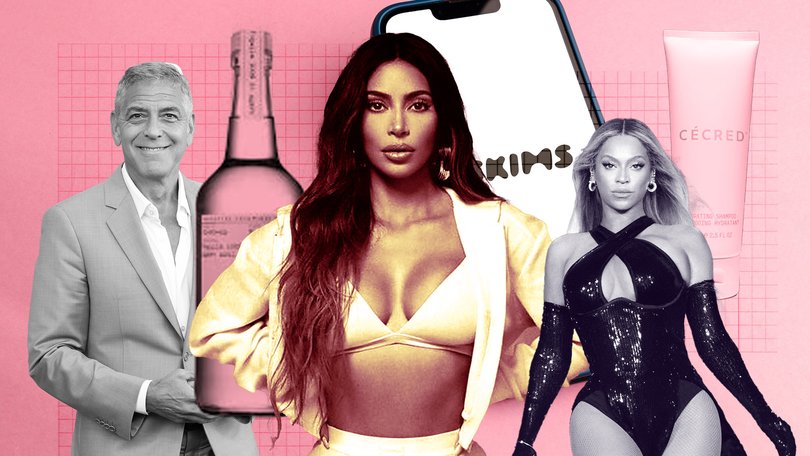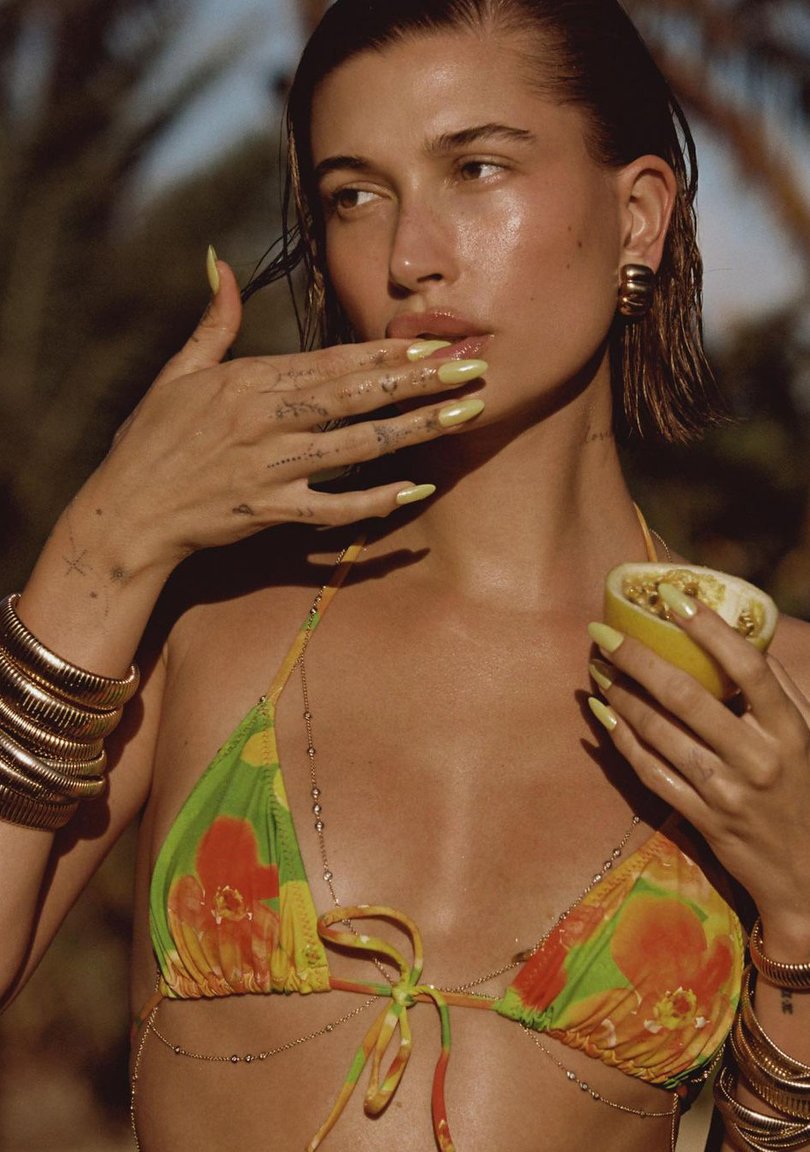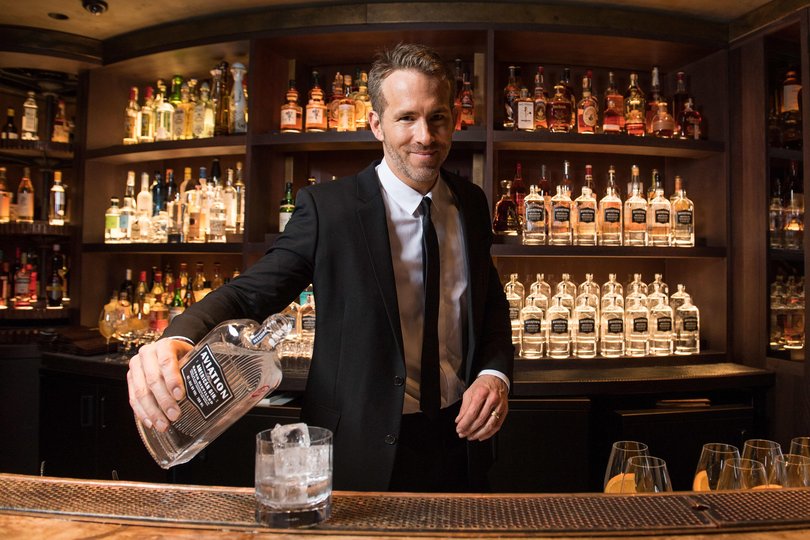THE ECONOMIST: Kim Kardashian, Hailey Bieber, Ryan Reynolds and the age of celebrity brands
THE ECONOMIST: As the boundary between retail and social media blurs, celebrities are reshaping the world of consumer goods.

Kim Kardashian launched Skims, her shapewear brand, in 2019 after spending years dabbing other undergarments with teabags to “nail the perfect nude shade”.
“It’s deeply personal to me,” says the reality-television star. It has also been tremendously lucrative. Skims now makes some $US1 billion ($1.5b) in sales a year.
From fizzy drinks and footwear to fragrances, over the years celebrities have peddled them all. In the past, most stars were happy simply lending their faces to ad campaigns in return for a bit of extra pocket money.
Sign up to The Nightly's newsletters.
Get the first look at the digital newspaper, curated daily stories and breaking headlines delivered to your inbox.
By continuing you agree to our Terms and Privacy Policy.A few more entrepreneurial ones went a step further, involving themselves in the design of the products they endorsed.
In the 1980s a chance encounter on an aeroplane between Jane Birkin, a British actress, and a senior executive at Hermès, a luxury brand, led to the creation of the Birkin bag.
Around the same time Michael Jordan, a basketball star, teamed up with Nike, a sports brand, to launch the Air Jordan line of trainers.
More recently, however, a growing number of celebrities have opted to build consumer enterprises of their own. Over the past decade or so, A-listers from Beyoncé and Rihanna to George Clooney and Harry Styles have launched beauty ranges, booze brands, fashion labels and more.
A study in 2023 by JLL, a property firm, found that around three-fifths of celebrity retail brands in America had been founded in the preceding six years.

Since then the trend has continued apace, with stars from Dwayne “The Rock” Johnson (men’s skincare) and Emma Watson (gin) to Sir David Beckham (supplements) and Wiz Khalifa (mushroom-growing kits) all taking part.
In May Hailey Bieber, wife of Justin Bieber, a pop star, sold her make-up brand Rhode to e.l.f. Beauty, a cosmetics firm, for as much as $1b.
As the boundary between retail and social media blurs, celebrities are reshaping the world of consumer goods.
The proliferation of celebrity brands is partly a reflection of changes in the media industry. In decades past, the business of communicating with consumers was largely intermediated by a handful of television channels, radio stations and print publications. No more.
These days, says Douglas Holt, a marketing guru, every social-media account is a channel of its own. That has allowed celebrities to engage directly with their fans.
Ms Kardashian has over 350m followers on Instagram. She frequently wears and talks about Skims online. “Kim is a phenomenal creative director,” says Jens Grede, her co-founder, “but she’s also a one-woman media powerhouse.”
According to Launchmetrics, an analytics firm, Skims last year generated more than $US600m in “media impact value”, a gauge of the monetary benefit of online posts, press coverage and other media exposure. That was eight times as much as for Spanx, a rival shapewear brand.
Not only are celebrities now able to communicate directly with their fans. They can sell directly to them, too.
Fledgling brands no longer need to sell via big retailers, who take a cut of profits, or to open physical stores, which involves enormous upfront investment. To sell online, they do not even need to go through e-commerce platforms like Amazon.
Tools such as those offered by Shopify, a Canadian software firm, have made it easier than ever to build an e-commerce site or mobile app.
Social-media platforms such as TikTok now allow brands to sell directly to users, too.
Direct-to-consumer sales have risen to account for around one-seventh of e-commerce globally, according to NIQ, a data provider.
Anita Balchandani of McKinsey, a consultancy, reckons they make up as much as 100 per cent of revenue in the early days of a typical celebrity brand, dropping to 30-60 per cent as firms expand and add third-party distribution.
Of course, not every celebrity brand takes off. The Honest Company, a maker of baby and beauty products co-founded by Jessica Alba, an actress, has lost three-quarters of its market value since listing its shares in 2021.
Alex Griffin, marketing chief for On, a sportswear brand worn by tennis player Roger Federer and actress Zendaya, says there is a reason many stars still opt for endorsements instead of starting their own brands: “It’s not that easy.”
Picking the right type of product matters. Clothes and booze are things people often buy for what they symbolise, rather than their functionality, says Sandra Cariglio of ReD Associates, an advisory firm.
That makes them safer bets for celebrities. Attractive stars may naturally find it easy to sell beauty products, too. It helps that the production of cosmetics is easy to outsource to white-label manufacturers, as it is for fragrances.
Jill Avery of Harvard Business School adds that products need to “fit” the celebrity’s own brand. Fans buy make-up from Ms Bieber because she has long shared beauty tips online, and shapewear from Ms Kardashian because she is known for her curves.
Asked why he is launching a running app, Mo Farah, an athlete with four Olympic gold medals to his name, says simply: “That’s all I know.”
Still, some celebrities appear able to sell anything. Ryan Reynolds, a rom-com star turned potty-mouthed superhero, became the face of Mint Mobile, a telecoms firm, in 2019 after he acquired some 25 per cent of the business.
Last year T-Mobile, a bigger rival, bought Mint’s parent company for around $US1.3b. In 2021 Mr Reynolds snapped up Wrexham AFC, a struggling Welsh football team, for £2m ($4m) with a fellow actor.
The team’s improving performance — and an Emmy-award-winning documentary co-produced by Mr Reynolds — have significantly raised its profile. The club is now said to be raising money at a valuation of up to £350m.

For celebrities who stick to consumer goods, having a decent product is essential. The online attention enjoyed by celebrity brands comes with added scrutiny.
Goop, a lifestyle brand founded by Gwyneth Paltrow, an Oscar-winning actress, has been pilloried for making unscientific claims about its wares. (It sells a jade egg customers are told to insert in their vaginas.) Last year it sacked almost a quarter of its employees. Wrestler Hulk Hogan’s line of frozen cheeseburgers were a flop mostly because they were awful.
Picking the right business partner can help. Stars may have plenty of experience with publicity, but they often need help with the nitty-gritty of running a business.
Idris Elba, a British actor, co-founded his wine business, Porte Noire, with David Farber, a Frenchman with over a decade of experience in the industry.
While Mr Elba is heavily involved in the business, it is Mr Farber who takes the lead in finding producers and selecting the best blends.
“I’ve got a lot on my plate with film, music and other projects, so I knew I needed the right partner,” says Mr Elba.
Lucky stars
Various incubators now help celebrities build their own companies. United Talent Agency, based in Los Angeles, has a venture arm that helped comedian Seth Rogen launch a cannabis brand and actress Elizabeth Banks get into canned wine.
Creative Artists Agency, another Hollywood talent manager, has backed a similar incubator, called Caravan.
Last month Universal Music Group, a record label, announced a partnership with the co-founder of WME, one more talent agency, to help its musicians get into new lines of business, including fashion and other consumer goods.
Building a celebrity brand may be easier than ever. But maintaining one is still hard. Celebrities wax and wane, even more so in the age of social media. It is not a coincidence that Skims is only obliquely named after its famous co-founder.
Reflecting on what they are trying to achieve with the business, Mr Grede recalls a photograph he recently came across of a young boy sporting Air Jordans and a pair of Beats headphones, a brand co-founded in the 2000s by Dr Dre, a rapper and music producer, which was later bought by Apple.
The boy would have been far too young to have ever seen Mr Jordan shoot hoops or heard Dr Dre top the charts. For celebrity brands, the hardest test will be the test of time.
Originally published as Kim Kardashian, Ryan Reynolds and the age of the celebrity brand
